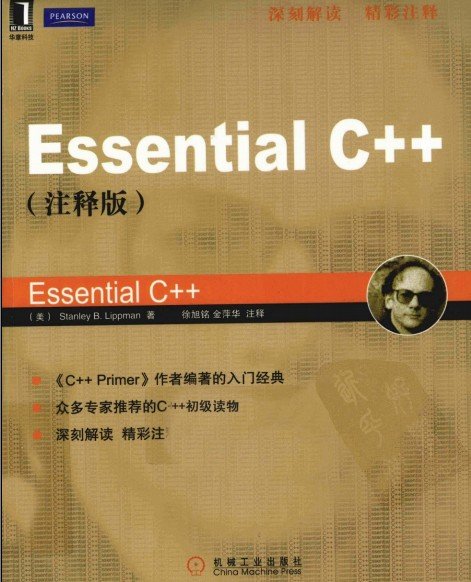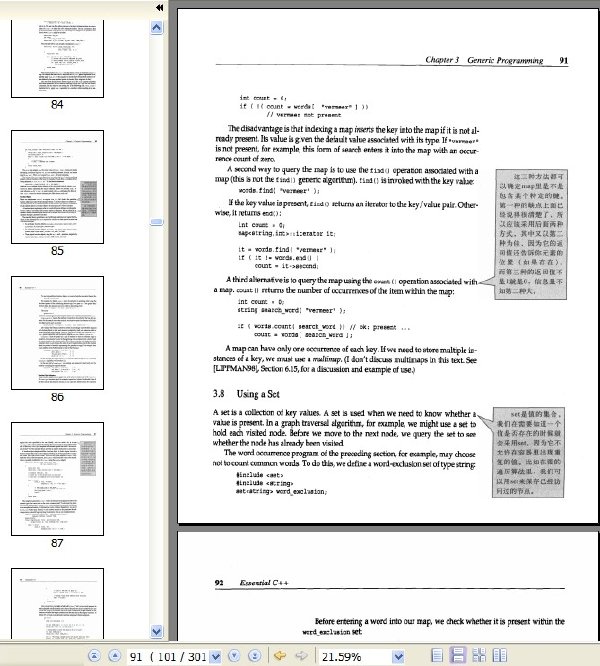《Essential C++(注釋版)》掃描版[PDF] 簡介: 中文名 : Essential C++(注釋版) 作者 : (美國) 斯坦利 (Stanley B.Lippman) 圖書分類 : 軟件 資源格式 : PDF 版本 : 掃描版 出版社 : 機械工業出版社 書號 : 9787111312215 發行時間 : 2010年10月01日 地區 : 大陸 語言 : 簡體中文 簡介 :
"《Essential C++(注釋版)》掃描版[PDF]"介紹
中文名: Essential C++(注釋版)
作者: (美國) 斯坦利 (Stanley B.Lippman)
圖書分類: 軟件
資源格式: PDF
版本: 掃描版
出版社: 機械工業出版社
書號: 9787111312215
發行時間: 2010年10月01日
地區: 大陸
語言: 簡體中文
簡介:

內容簡介:
《Essential C++(注釋版)》為那些沒有太多時間學習的程序員提供了一條在工作中學習C++的捷徑。它把重點放在那些C++編程中重要的要素上,並覆蓋能夠幫助解決實際編程問題的特性和技術。《Essential C++(注釋版)》將C++的基本內容按照過程風格、泛型風格、基於對象風格,以及面向對象風格進行組織。《Essential C++(注釋版)》以復雜度漸進的風格展開,並在討論解決方案的過程中引入語言特性,便於學習C++的功能和結構,同時理解其目的和基本理念。
資源來自網絡,如侵犯了您的權利,請點擊,謝謝!
白盤用戶請到電驢主站1樓評論處找下載鏈接。
內容截圖:

目錄:
序言
前言
Chapter 1: Basic C++ Programming
1.1: How to Write a C++ Program
1.2: Defining and Initializing a Data Object
1.3: Writing Expressions
1.4: Writing Conditional and Loop Statements
1.5: How to Use Arrays and Vectors
1.6: Pointers ALlow for Flexibility
1.7: Writing and Reading Files
Chapter 2: Procedural Programming
2.1: How to Write a Function
2.2: Invoking a Function
2.3: Providing Default Parameter Values
2.4: Using Local Static Objects
2.5: Declaring a Function Inline
2.6: Providing Overloaded Functions
2.7: Defining and Using Template Functions
2.8: Pointers to Functions Add Flexiblity
2.9: Setting Up a Header File
Chapter 3: Generic Programming
3.1: The Arithmetic of Pointers
3.2: Making Sense of Iterators
3.3: Operations Common to All Containers
3.4: Using the Sequential Containers
3.5: Using the Generic Algorithms
3.6: How to Design a Generic Algorithm
3.7: Using a Map
3.8: Using a Set
3.9: How to Use Iterator Inserters
3.10: Using the iostream Iterators
Chapter 4: Object-Based Programming
4.1: How to Implement a Class
4.2: What Are Class Constructors and the Class Destructor?
4.3: What Are mutable and const?
4.4: What Is the this Pointer?
4.5: Static Class Members
4.6: Building an Iterator Class
4.7: Collaboration Sometimes Requires Friendship
4.8: Implementing a Copy Assignment Operator
4.9: Implementing a Function Object
4.10: Providing Class Instances of the iostream Operators
4.11: Pointers to Class Member Functions
Chapter 5: Object-Oriented Programming
5.1: Object-Oriented Programming Concepts
5.2: A Tour of Object-Oriented Programming
5.3: Polymorphism without Inheritance
5.4: Defining an Abstract Base Class
5.5: Defining a Derived Class
5.6: Using an Inheritance Hierarchy
5.7: How Abstract Should a Base Class Be?
5.8: Initialization, Destruction, and Copy
5.9: Defining a Derived Class Vh-tual Function
5.10: Run-Tune Type Identification
Chapter 6: Programming with Templates
6.1: Parameterized Types
6.2: The Template Class Definition
6.3: Handling Template Type Parameters
6.4: Implementing the Template Class
6.5: A Function Template Output Operator
6.6: Constant Expressions and Default Parameters
6.7: Template Parameters as Strategy
6.8: Member Template Functions
Chapter 7: Exception Handling
7.1: Throwing an Exception
7.2: Catching an Exception
7.3: Trying for an Exception
7.4: Local Resource Management
7.5: The Standard Exceptions
Appendix A: Exercise Solutions
Appendix B: Gener/c Algorithms Handbook
Index
注釋
作者: (美國) 斯坦利 (Stanley B.Lippman)
圖書分類: 軟件
資源格式: PDF
版本: 掃描版
出版社: 機械工業出版社
書號: 9787111312215
發行時間: 2010年10月01日
地區: 大陸
語言: 簡體中文
簡介:

內容簡介:
《Essential C++(注釋版)》為那些沒有太多時間學習的程序員提供了一條在工作中學習C++的捷徑。它把重點放在那些C++編程中重要的要素上,並覆蓋能夠幫助解決實際編程問題的特性和技術。《Essential C++(注釋版)》將C++的基本內容按照過程風格、泛型風格、基於對象風格,以及面向對象風格進行組織。《Essential C++(注釋版)》以復雜度漸進的風格展開,並在討論解決方案的過程中引入語言特性,便於學習C++的功能和結構,同時理解其目的和基本理念。
資源來自網絡,如侵犯了您的權利,請點擊,謝謝!
白盤用戶請到電驢主站1樓評論處找下載鏈接。
內容截圖:

目錄:
序言
前言
Chapter 1: Basic C++ Programming
1.1: How to Write a C++ Program
1.2: Defining and Initializing a Data Object
1.3: Writing Expressions
1.4: Writing Conditional and Loop Statements
1.5: How to Use Arrays and Vectors
1.6: Pointers ALlow for Flexibility
1.7: Writing and Reading Files
Chapter 2: Procedural Programming
2.1: How to Write a Function
2.2: Invoking a Function
2.3: Providing Default Parameter Values
2.4: Using Local Static Objects
2.5: Declaring a Function Inline
2.6: Providing Overloaded Functions
2.7: Defining and Using Template Functions
2.8: Pointers to Functions Add Flexiblity
2.9: Setting Up a Header File
Chapter 3: Generic Programming
3.1: The Arithmetic of Pointers
3.2: Making Sense of Iterators
3.3: Operations Common to All Containers
3.4: Using the Sequential Containers
3.5: Using the Generic Algorithms
3.6: How to Design a Generic Algorithm
3.7: Using a Map
3.8: Using a Set
3.9: How to Use Iterator Inserters
3.10: Using the iostream Iterators
Chapter 4: Object-Based Programming
4.1: How to Implement a Class
4.2: What Are Class Constructors and the Class Destructor?
4.3: What Are mutable and const?
4.4: What Is the this Pointer?
4.5: Static Class Members
4.6: Building an Iterator Class
4.7: Collaboration Sometimes Requires Friendship
4.8: Implementing a Copy Assignment Operator
4.9: Implementing a Function Object
4.10: Providing Class Instances of the iostream Operators
4.11: Pointers to Class Member Functions
Chapter 5: Object-Oriented Programming
5.1: Object-Oriented Programming Concepts
5.2: A Tour of Object-Oriented Programming
5.3: Polymorphism without Inheritance
5.4: Defining an Abstract Base Class
5.5: Defining a Derived Class
5.6: Using an Inheritance Hierarchy
5.7: How Abstract Should a Base Class Be?
5.8: Initialization, Destruction, and Copy
5.9: Defining a Derived Class Vh-tual Function
5.10: Run-Tune Type Identification
Chapter 6: Programming with Templates
6.1: Parameterized Types
6.2: The Template Class Definition
6.3: Handling Template Type Parameters
6.4: Implementing the Template Class
6.5: A Function Template Output Operator
6.6: Constant Expressions and Default Parameters
6.7: Template Parameters as Strategy
6.8: Member Template Functions
Chapter 7: Exception Handling
7.1: Throwing an Exception
7.2: Catching an Exception
7.3: Trying for an Exception
7.4: Local Resource Management
7.5: The Standard Exceptions
Appendix A: Exercise Solutions
Appendix B: Gener/c Algorithms Handbook
Index
注釋
相關資源:
- [其他圖書]《健身氣功:易筋經》掃描版[PDF]
- [人文社科]《世界氣候志 下》
- [人文社科]《3ds max 5 室外效果圖制作捷徑》[ISO]
- [小說圖書]《同居後,又住進來一個美女》掃描版[PDF]
- [文學圖書]《官場詩客》(高章采)掃描版[PDF]
- [其他圖書]《當科研成為一種職業》掃描版[PDF]
- [其他圖書]《披頭士編年史》(The Complete Beatles Chronicle)(Mark Lewisohn)[PDF]
- [教育科技]《笛子演奏技巧十講》(趙松庭)文字版[PDF]
- [生活圖書]《NBA體能訓練:專家設計的122項練習》掃描版[PDF]
- [人文社科]《經濟欺詐的識別與防范》文字版[PDF]
- [生活圖書]《法古錄》掃描版[PDF]
- [英語學習資料]《標准韓國語1-3冊.PDF+官方清晰錄音》第3版(2002年7月1日)[MP3]
- [電腦基礎]《編程經典Visual Foxpro視頻教程》(AVI格式)更新完
- [英語學習資料]《考研英語易考范文背誦80篇》mp3+Lrc[壓縮包]
- [英語學習資料]《BBC 留學英國(普通話)》(Study in the UK (Mandarin))周末統一供源請耐心等待[壓縮包]
- [生活圖書]《廣告攝像教程》掃描版[PDF]
- [學習課件]LCD1602液晶完整中文資料[rar]
- [光盤游戲]《黑客帝國:尼奧之路》(The Matrix: Path of Neo)破解版[ISO]
- [硬盤游戲]《重力世界》(And Yet It Moves)正式破解版【更新v1.05補丁】[安裝包]
- [教育綜合]2016年教師招聘考試《小學教育理論基礎知識》復習全書【核心講義+歷年真題詳解】.zip
- 《鳥哥的Linux私房菜:服務器架設篇(第二版)》(鳥哥)掃描版[PDF]
- Cisco路由器性能測試
- 《Manning In Action系列圖書》e.Book[PDF]
- 《iOS的圖像和動畫處理》(Graphics and Animation on iOS: A Beginners Guide to Core Graphics and Core Animation)英文文字版/更新EPUB版本/更新源代碼[PDF]
- 《黑客攻防入門(全彩版)》掃描版[PDF]
- 《C++ Primer Plus(第6版)中文版》掃描版[PDF]
- 《熱門電腦叢書:如何用電腦制作家庭電影》全彩版[PDF]
- 《主題插畫講座:背景插畫的制作方法》全彩版[PDF]
- 《Maya火星課堂(第1、2版)》全彩掃描版[PDF]
- 《新手學黑客攻防》掃描版[PDF]
- 電腦組裝與維修-技能實訓(第3版)隨書光盤(By L-Blue [email protected])
- 《邊用邊學PHOTOSHOP效果圖表現方法與技巧》掃描版[PDF]
免責聲明:本網站內容收集於互聯網,本站不承擔任何由於內容的合法性及健康性所引起的爭議和法律責任。如果侵犯了你的權益,請通知我們,我們會及時刪除相關內容,謝謝合作! 聯系信箱:[email protected]
Copyright © 電驢下載基地 All Rights Reserved



